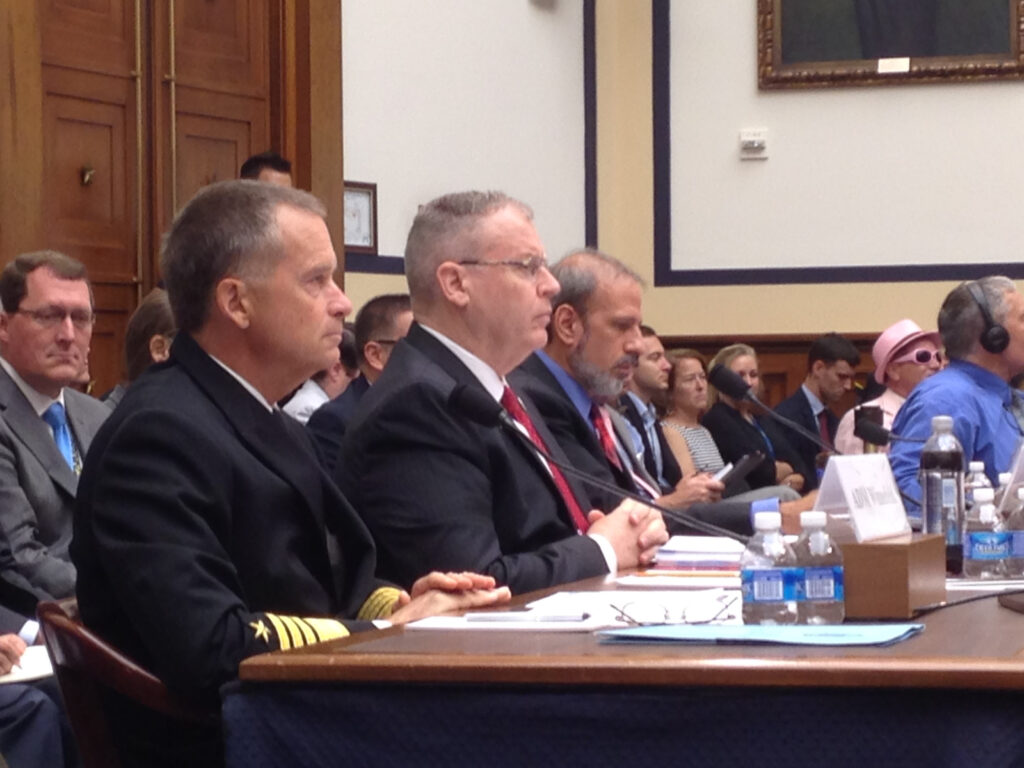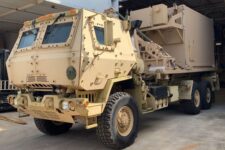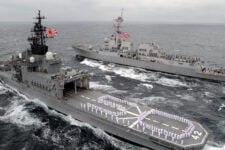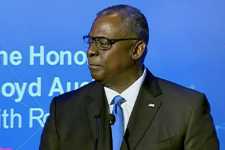
Deputy Defense Secretary Robert Work (center) settles in for a brutal hearing, flanked by Adm. James Winnefeld (left) and comptroller Mike McCord (right).
CAPITOL HILL: It was a bad day to be Bob Work. At his first public hearing before Congress as Deputy Secretary of Defense, Work received a bipartisan battering from a House Armed Services Committee deeply dissatisfied with the administration’s $58.6 billion request for Overseas Contingency Operations (OCO) funding.
At issue was not the $53.7 billion in Afghanistan-related funding that made up 92 percent of the request, which went unchallenged: Indeed, HASC chairman Buck McKeon argued the administration should have asked for more. Instead the furor focused on the $5 billion Counterterrorism Partnerships Fund (CTPF), an open-ended initiative – so open-ended that some members denounced it as a “slush fund” – which the President proposed May 28th without providing Congress the lead time or the detail it considered its constitutional due.
As hearing ground to its end, the Deputy Secretary of Defense and other administration witnesses received a valedictory drubbing from Rep. Adam Smith, HASC’s top Democrat and normally an Obama administration ally.
“This is really, really poorly drafted,” Smith said after reading aloud a section of the counterterrorism fund language. “A, this has got to be fixed. B, it’s really not good that it came to us in this form in the first place.”
“That’s why it never hurts to talk to Congress,” Smith said drily. “We could point these things out in other than a public hearing.”
Smith and his HASC colleagues were especially leery of two parts of the $5 billion fund: $500 million to train and arm moderate Syrian rebels – which Smith in fact supports – and another $500 million for “crisis response” – which Smith said was so vaguely defined it could be spent on a mid-life refueling for an aircraft carrier.
It’s “not our intent and our design” to use the fund that way, replied new Pentagon comptroller Mike McCord, who testified alongside Work.
“Your intent and your design are irrelevant,” Smith shot back. “It’s a piece of legislation.”
“We stand ready to work with you” on the language, McCord said mildly.
The counterterrorism fund would mostly operate by flowing extra money through accounts and authorities the Congress, the administration witnesses said, and it would do so only with 15 days’ notice to Congress – that is, unless an urgent crisis required a swifter response. The witnesses emphasized the need for “flexibility” and a certain degree of open-endedness in the language.
Given growing instability in Syria and Iraq, “we know that we’re going to be doing something. We’re not sure what it is,” Dep. Sec. Work said. “It’s impossible for us to predict exactly what it might be.”
Similarly, with the aid to Syrian rebels, not only are almost all the details classified, but they’re far from finalized. “We are still frankly working through what are some very challenging legal issues [and] some very challenging partnership issues [both] inside and outside of Syria,” said Adm. James “Sandy” Winnefeld, Vice-Chairman of the Joint Chiefs of Staff.
“[Saying] A, we can’t talk about it, B, we haven’t quite figured it out, doesn’t inspire confidence or support,” Smith retorted.
“I want you to sell this successfully,” Smith said. While other members denounced any involvement in what they consider a potential quagmire of untrustworthy factions, Smith insisted that there are moderate Syrian rebels we can trust, that the US needs them as an alternative to the Iran-backed Assad regime on the one hand and Islamic extremists on the other, and “if we don’t better train and equip these guys, they’re going to get killed.”
“[But] you’ve got to make the case,” Smith said. “If the White House is going to push a policy like this, they’ve got to frickin’ push the policy. They can’t not say anything to us” for months only to for President Obama to announce the $5 billion initiative just weeks before submitting the OCO request. “Sell it! Because if you don’t, there ain’t no way we’re going to pass it.”
No service can fight on its own: JADC2 demands move from self-sufficiency to interdependency
Making all-domain operations a warfighting capability means integrating, fusing, and disseminating a sensor picture appropriate for a particular theater segment, not all of them, says the Mitchell Institute’s David Deptula.



























